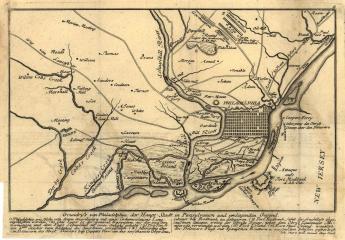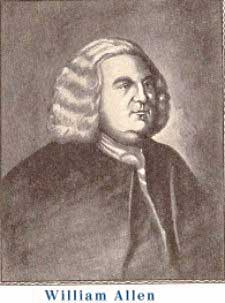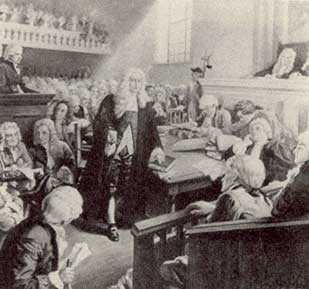Related Topics
Colonial Philadelphia (Pre- 1776)
 It's surprising to most Americans to learn the American Revolution was not the beginning, but almost half-way through the European settlement. And before the Revolution, there were thousands of years of settlement by non-European tribes. We know more about non-European settlers than we did fifty years ago, but records are still very poor or non-existent, and not likely to catch up very rapidly. History will begin in 1492 for a very long time. Long before that, it isn't history, it's anthropology.
It's surprising to most Americans to learn the American Revolution was not the beginning, but almost half-way through the European settlement. And before the Revolution, there were thousands of years of settlement by non-European tribes. We know more about non-European settlers than we did fifty years ago, but records are still very poor or non-existent, and not likely to catch up very rapidly. History will begin in 1492 for a very long time. Long before that, it isn't history, it's anthropology.
To Germantown, a Short Appreciation
Seven miles from the heart of Philadelphia, Germantown was once a separate town, the cultural center of Germans in America. Revolutionary battles were fought here, it was briefly the capital of the United States, and it still has an outstanding collection of schools and colleges.
Philadelphia Legal Scene
The American legal profession grew up in this town, creating institutions and traditions that set the style for everyone else. Boston, New York and Washington have lots of influential lawyers, but Philadelphia shapes the legal profession.
Bystanders to the Revolution
It wasn't heroic to everyone.
Revolutionary Philadelphia's Loyalists
History is written by the victors, so the Tory Loyalists of Revolutionary Philadelphia have mostly fallen from view.
Touring Philadelphia's Western Regions
Philadelpia County had two hundred farms in 1950, but is now thickly settled in all directions. Western regions along the Schuylkill are still spread out somewhat; with many historic estates.
City Hall to Chestnut Hill
There are lots of ways to go from City Hall to Chestnut Hill, including the train from Suburban Station, or from 11th and Market. This tour imagines your driving your car out the Ben Franklin Parkway to Kelly Drive, and then up the Wissahickon.
William Allen, Tory

|
| William Allen |
William Allen was once famous for his expensive carriage and a team of horses, at a time when there were only eighty carriages in the colony. He was born wealthy but personally made considerable sums in maritime trade, which in those days included a mild form of piracy called privateering. Taking his accumulated wealth, he invested heavily in colonial real estate. His urban ventures included the land under Independence Hall, and his lands in the hinterland included the present town of Easton. He was a tough businessman, providing "muscle" where needed in a colony dominated by pacifist Quakers. At one point, he imported a thousand muskets and ammunition for the use of settlers in the Lehigh Valley who had difficulties with the Indians and Connecticut invaders. Allentown is named after him.

|
| Philadelphia Lawyer |
It is difficult to apply present standards of judgment to Allen. William Penn had been given the colony on condition that he protect and maintain it. That was clearly a difficult challenge for a Quaker colony in the wilderness, surrounded by Indians, French and Spanish buccaneers, and neighboring colonies who were far from pacifist themselves. The system often amounted to giving land to subcontractors like Allen, on condition that they maintain law and order. Furthermore, Allen was quite obviously a person of parts. His credentials as Chief Justice were based on his attendance at the Inns of Court when almost all other lawyers were trained by local apprenticeships. His father in law was Andrew Hamilton, the famous "Philadelphia lawyer" who won the landmark case for Peter Zenger and later became the leader of the Pennsylvania Assembly and mentor to young Benjamin Franklin. His land-dispute services in the negotiations with Lord Baltimore were notable. In general, he was a continuing force for peace and stability, and no one held it against him that peace and stability suited his needs as a landlord and merchant. To him, the battle for independence was just another unsettling disturbance which prevented the colony from achieving its potential.
His daughter married John Penn, the grandson of William Penn, who was the local representative of the Proprietors and later the Governor. All in all, it is not surprising that he retreated to his home on Germantown Avenue, called Mt. Airy, when the revolution broke out. Unlike many other Tories who fled to Canada, he felt his past services would protect him if he remained quiet and secluded until the war was over. He didn't quite make it, dying in his mansion, in 1780.
Originally published: Monday, October 16, 2006; most-recently modified: Wednesday, May 29, 2019